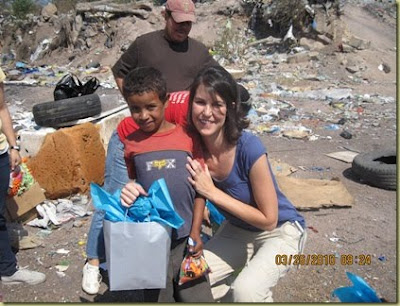Nine years ago Jeony and Jesy Ordoňez climbed the dusty road to Tegucigalpa´s landfill and pioneered the first classes reaching children of the garbage dump. Their first effort birthed tremendous success. AFE´s bright, successful 10th grade class were Jeony and Jessy´s original students. When they were six and seven years old, these first students sat on discarded tires and used their knees as desks to scratch out their first letters.
Since that time, AFE´s teaching staff has grown to sixteen qualified educators. Its enrollment has grown to 150 children, each connected to the garbage dump in some way, all learning in excellent classrooms and facilities.
Amor, Fe y Esperanza has accomplished so much since its humble beginnings. Yet over the last couple of years we have noticed a startling trend. Many of the children newest to school from the garbage dump have started strong in the beginning of the year, only to slowly drop out and go back to the work in the trash. It is hard to imagine why any child would choose garbage collecting over school. Perhaps it’s the freedom and disposable income (although its miniscule) available in trash-picking. Perhaps it’s the pressure to help provide for their families. Whatever the reason, perhaps it is time for us to refocus our efforts and get back to our roots.

Marvin and Daisy enjoy classes.
This year AFE has begun a strategy to keep new children at AFE for the entire year, even until they graduate high school. At the beginning of each year we will provide new students with a transition process from the dump to the classroom. By teaching children where they feel comfortable, we hope to show them that learning is fun, necessary and invaluable. Melanie Miller, who has helped teach classes in the dump describes the experience this way:
“Teaching in the dump is neither without its challenges nor without its joys. Daily, the staff is greeted with smiles and hugs of waiting students. Discarded tires and cracked pails serve as chairs, but not one complaint is heard. Needled syringes are a play thing and dingy dogs, an armrest. Any and every activity presented is greeted with rapt attention. Sadly, there are 14 year olds in 3rd grade and 3rd graders who don’t know their alphabet.”
The classes span several different areas, divided by grade level. Adult education is offered. Yet, just over the hill, families opt to work instead of take an hour off for school. Mothers encourage their children to sort through garbage instead of learning how to read and write.

Ruth shows the little lamb she made.
In January this new effort took off. Just three months later, twenty-six new children (who worked in garbage themselves), are signed up for classes at AFE. Twenty-six more children will have the chance at a bright future.
While our new (or rather, old) strategy is bearing fruit, the problem of child labor in the dump continues. Soon it will be time to offer more than simply a carrot. Our prayer is that God will provide the means, perhaps through political power, to urge the government to enforce child labor laws already in existence.
“There is a life of dignity, joy and freedom AFE wants to offer these children. They are beautiful and smart and desperately precious. And while they may not know it yet…it is our job to show them.” (Melanie Miller).
 Marvin:
Marvin:








